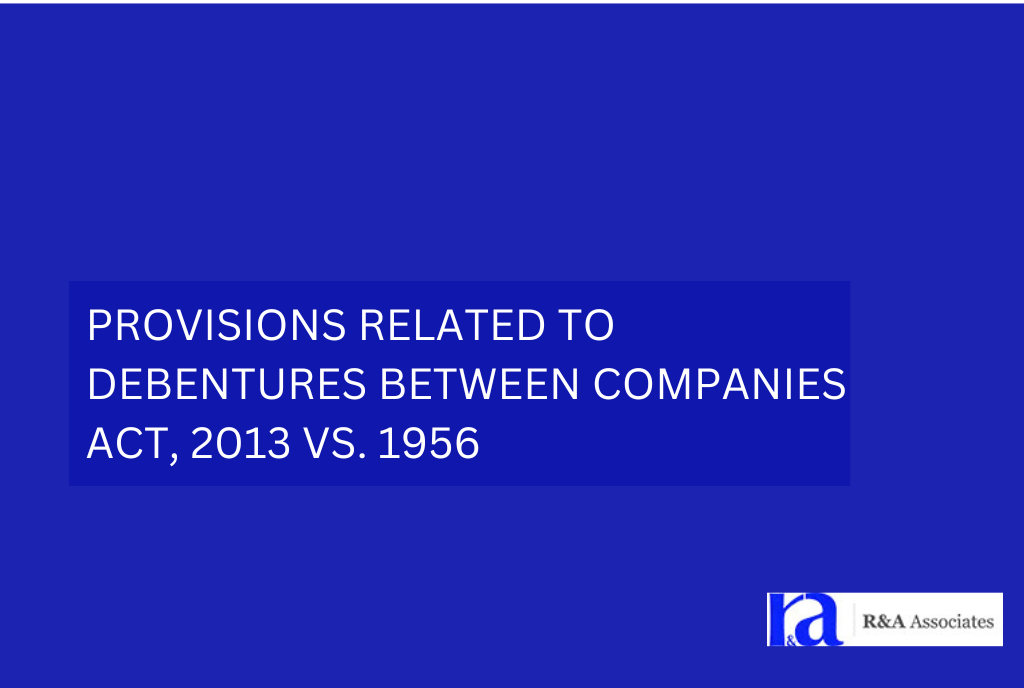| S. NO. | BASIS OF DIFFRENCE | COMPANIES ACT, 2013 | COMPANIES ACT, 1956 | DIFFRENCE |
| 1. | Conversion | As per section 71(1): A company may issue debentures with an option to convert such debentures into shares, either wholly or partly at the time of redemption.
Provided that the issue of debentures with an option to convert such debentures into shares, wholly or partly, shall be approved by a special resolution passed at a general meeting.
|
No such option | A company may issue debentures with an option to convert such debentures into shares, either wholly or partly at the time of redemption; subject to approval by a special resolution passed at a general meeting. |
| 2. | Issue of secured debentures | As per section 71(3): Secured debentures may be issued by a company subject to such terms and conditions as may be prescribed
|
No such provisions. | Now secured debentures can be issued by companies subject to certain terms and conditions. |
| 3. | Rules for debenture trustee to protect the interest of the debenture holders | As per section 71(4): A debenture trustee shall take steps to protect the interests of the debenture holders and redress their grievances in accordance with such rules as prescribed. | No such rules | The powers of debenture trustee to protect the interests of the debenture holders and redress their grievances shall be in accordance with the prescribed rules. |
| 4. | Appointment of Debenture Trustee | As per section 71(5):
No company shall issue a prospectus or make an offer or invitation to the public or to its members exceeding five hundred for the subscription of its debentures, unless the company has, before such issue or offer, appointed one or more debenture trustees and the conditions governing the appointment of such trustees shall be such as may be prescribed |
As per Section 117B:
(1) No company shall issue a prospectus or a letter of offer to the public for subscription of its debentures, unless the company has, before such issue, appointed one or more debenture trustees for such debentures and the company has, on the face of the prospectus or the letter of offer, stated that the debenture trustee or trustees have given their consent to the company to be so appointed. |
Companies Act, 2013 provides that only when the companies issue prospectus or make an offer or invitation to the public or its members exceeding 500 for the subscription of its debentures, then only it is required to appoint a debenture trustee. |
| 5. | Power vested with Tribunal | As per section 71(9):
Where at any time the debenture trustee comes to a conclusion that the assets of the company are insufficient or are likely to become insufficient to discharge the principal amount as and when it becomes due, the debenture trustee may file a petition before the Tribunal and the Tribunal may, after hearing the company and any other person interested in the matter, by order, impose such restrictions on the incurring of any further liabilities by the company as the Tribunal may consider necessary in the interests of the debenture holders. |
As per Section 117B(4) :
Where at any time the debenture trustee comes to a conclusion that the assets of the company are insufficient or are likely to become insufficient to discharge the principal amount as and when it becomes due, the debenture trustee may file a petition before the Central Government and the Central Government may, after hearing the company and any other person interested in the matter, by an order, impose such restrictions on the incurring of any further liabilities as the Central Government thinks necessary in the interests of holders of the debentures. |
In case the Debenture Trustee comes to a conclusion that the assets of the company are insufficient or likely to become insufficient, then he or she may file a petition before the Tribunal instead of Central Government. |
| 6. | Penal provision for non-compliance with the requirements. | As per section 71(11): If any default is made in complying with the order of the Tribunal under this section, every officer of the company who is in default shall be punishable with imprisonment for a term which may extend to three years or with fine which shall not be less than two lakh rupees but which may extend to five lakh rupees, or with both. | As per section 117C (4) Where a company fails to redeem the debentures on the date of maturity, the Tribunal may, on the application of any or all the holders of debentures shall, after
hearing the parties concerned, direct, by order, the company to redeem the debentures forthwith by the payment of principal and interest due thereon. Under section 117C(5): If default is made in complying with the order of the Tribunal under sub-section (4), every officer of the company who is in default, shall be punishable with imprisonment which may extend to three years and shall also be liable to a fine of not less than five hundred rupees for every day during which such default continues. |
In case of failure to comply with any order of the Tribunal under the clause, the limits for monetary penalty have been increased. |
| 7. | Claim for specific performance. | As per section 71(12): A contract with the company to take up and pay for any debentures of the company may be enforced by a decree for specific performance. | No such option. | A contract with the company to take up and pay for any debentures of the company may be enforced by a decree for specific performance. |
